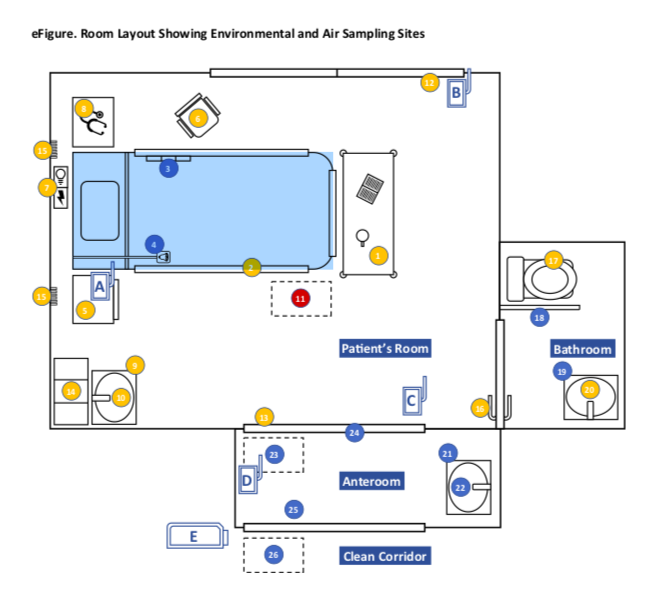Follow us on Telegram for the latest updates on Covid-19: https://t.me/mothershipsg
Singapore researchers from the National Centre for Infectious Diseases (NCID) and DSO National Laboratories found that patients with Covid-19 extensively contaminate their surroundings.
Their findings were published in the Journal of the American Medical Association (JAMA) on Mar. 4.
Samples taken from rooms of three patients
The study took samples from the rooms of three different patients who were isolated between January 24 and February 4, 2020.
The samples were taken on five days spread across two weeks.
Samples were taken from the rooms of Patients A and B after their rooms had undergone routine cleaning.
The sample from Patient C's room was taken before its routine cleaning.
 Diagram showing the test sites in each patient's room. Red circles indicate samples with strong positive results. Yellow circles indicate samples with weak positive results. Blue circles indicate samples with no positive results. Via.
Diagram showing the test sites in each patient's room. Red circles indicate samples with strong positive results. Yellow circles indicate samples with weak positive results. Blue circles indicate samples with no positive results. Via.
Uncleaned room was most contaminated
Even though Patient C had the mildest symptoms (only a cough) out of the three, Patient C's room was the most contaminated.
13 out of 15 test areas in Patient C's room tested positive for the SARS-CoV-2 virus (which causes Covid-19).
Patient C's chair, bed rail, glass window, floor, light switches, table, glass door, and locker were contaminated.
Three out of five test sites in Patient C's toilet (the inside of the sink, door handle, and surface of the toilet bowl) were contaminated as well.
The researchers said that the positive samples from the toilet bowl and sink suggest that the virus can be transmitted via stool.
And while air samples tested negative for the virus, the researchers found that samples from the air exhaust outlets tested positive, suggesting that droplets containing the virus can be carried by airflow, and deposited on other equipment.
Current decontamination measures are sufficient
On the other hand, samples from the rooms of Patients A and B (which were taken after they were cleaned) tested negative for the virus.
Routine cleaning comprised twice-daily cleaning of high-touch areas using 5000 ppm of sodium dichloroisocyanurate.
The floors were cleaned daily using 1000 ppm of the same substance.
Sodium dichloroisocyanurate is commonly used to sterilise drinking water, swimming pools as well as a disinfection agent against infectious diseases.
According to the researchers, this study shows that current decontamination measures are are sufficient, as long as people adhere to them.
Top image via NCID.
If you like what you read, follow us on Facebook, Instagram, Twitter and Telegram to get the latest updates.
